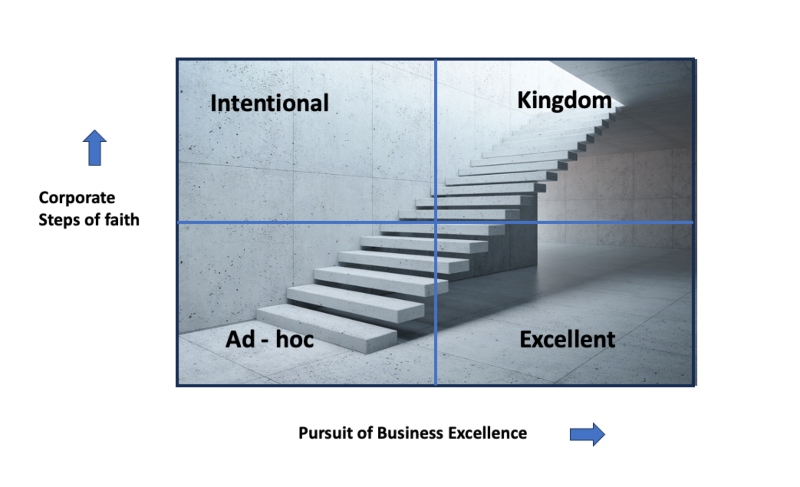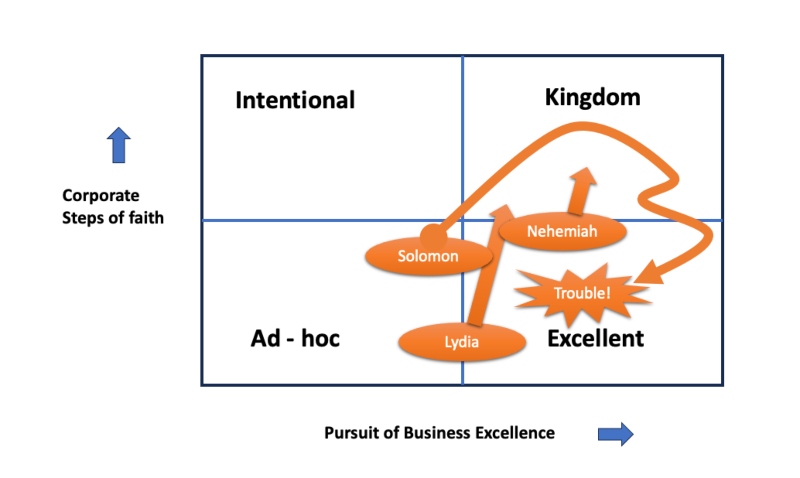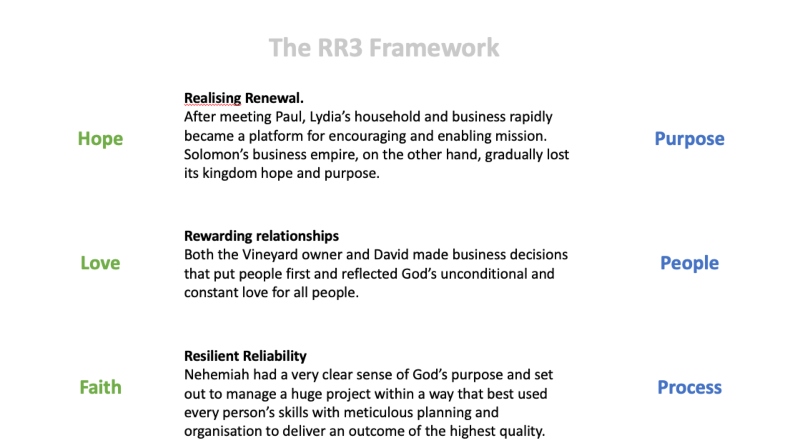What might a Kingdom business look like? A discussion
The final part of the series offers two ways to reflect on Lydia, Nehemiah, Solomon and David as exemplars in business

So far, we have used the combination of parables and Bible characters to draw a few insights from the stories and match them against business life today. To make things more systematic, we have developed a couple of tools in our forthcoming book, The Most Excellent Way, due out in the New Year.
Let’s try to apply this to our characters. Long-term sustainability firstly means embracing a level of business best-practice in order to compete with the best in the industry. Secondly, sustainability requires businesses to embrace the best values they can. Both goals require continuous journeys of improvement: hence the ‘staircase’ chart below. In this case we see owners or managers leaving Ad-hoc positions where they get by as best they can, to move to places where their beliefs and behaviour align in a virtuous enterprise.

There are several ways to think about the axes. One is to see the horizontal axis as earthly wisdom and the vertical axis as Godly wisdom, where the vertical journey might then be informed by the Sermon on the Mount’s counter-intuitive, upside-down thinking: turn the other cheek, love your enemy, give generously and don’t worry.
Clearly there will be a tension between the axes when we look at them in this way.
Or, again, the graph may show progress in God’s strength as opposed to progress based on human energy. This requires hearing God’s intention for the business and accepting that there are things that simply cannot be done in human strength.

Let’s migrate to a more overtly Kingdom version of this diagram (also in our book) and see a Kingdom business or project as the epitome of success in the top right corner.
Now, what can we do with this? Let see whether we can start to map out the journeys of the characters we have been studying.
We guess Lydia is running a good to excellent business because luxury clients are intolerant of poor service, and she was competing in a man’s world. With limited Kingdom intent, she starts her journey somewhere right of centre on the bottom row. Her encounter with Paul makes her operation suddenly key in spreading the Kingdom. Lydia’s business thus makes a significant step up and to the right in our chart.
Nehemiah is called to very clear and tangible Kingdom purpose. He has already learned from the best business leaders of the day and decides to commit his proven project management skills to fulfil God’s purposes for his fellow-Israelites. His journey is similarly upwards from a position of existing good practice.
It’s not clear where Solomon starts, but he assembles a diverse business empire and is soon investing the profits into a Kingdom project – the Temple. During the latter part of his reign, however, it all begins to go wrong and is evidently heading back down the chart. We have written elsewhere about creeping secularisation in modern businesses.
David and the vineyard owner are making decisions that equate to small steps of faith on the vertical axis. We can’t make strong conclusions about their overall direction of travel.
The critical way to use this tool is to work out what your journey looks like and where you would like it to go next.
Now, let’s move on to our second tool.
In our earlier publications (see here: Is God at work? with links to the rest of the blog series, Is Kingdom working?) we used the description of Kingdom that was given to us by the Apostle Paul, that of Faith, Hope and Love. We built bridges between Hope and business purpose, between Faith and business process and between Love and the management and care of people.
From this perspective, we can build a different view of our characters and their strengths and weaknesses. Again, the key thing is not whether we have extracted all the important business lessons from looking at these characters but to use them as worked examples of how we can look at our own business or projects, Monday to Friday.

If faith, hope, and love seem a little ethereal in the rough and tumble of business pursuits, both the characters and the frameworks we have used enable us to make realistic connections between the values we believe and how we behave at work.
What might a Kingdom business look like? Well, it might look like a staircase where each step takes up forward into better business process and greater virtue. It might look like hope expressing itself in business purpose, love, expressing itself through the network of stakeholder relationships, and faith expressing itself in robust and reliable processes that don’t let people down.
What your Kingdom business or your corner of someone else’s business looks like, is now in your court.
Image | Todd Quackenbush | Unsplash
This blog is part of a series that links Bible characters with people in parables to see if their stories fill in a picture of what a ‘Kingdom Business’ might look like. The series is looking for fresh insights for business leaders who want to see Kingdom outcomes as well as sustainable business success.
Details of all five blogs are below.
-
What might a Kingdom business look like? - business at the heart of mission through the example of Lydia (publishes 29 January)
-
God’s project manager - Nehemiah who prayed and planned ahead - and is an example of what godly project management could look like (publishes 31 January)
-
A business empire that loses its way - Solomon’s narrative goes to the heart of a vital tension in Kingdom business, which is how we balance economic outcomes with evangelistic progress (publishes 2 February)
-
Employing the whole person - How the vineyard owner and David were ahead of their time in looking beyond the work done (publishes 5 February)
-
What might a Kingdom business look like? A discussion - The final part of the series offers two ways to reflect on Lydia, Nehemiah, Solomon and David as exemplars in business (publishes 7 February)
Phil Hanson is an engineer by profession. For the latter part of a 30 year career in IBM, he was Lead Principal for IBM’s Manufacturing Industry Consulting Practice. Since IBM, he has been Principal Industrial Fellow at the Institute for Manufacturing at Cambridge University and a Special Advisor to UNIDO for supply chain projects in Africa. He is ordained in the Church of England.
Terry Young is a missionary kid who read science and engineering. After a PhD in lasers, he worked in R&D before becoming a professor, when he taught project management, information systems and e-business, while leading research in healthcare. He set up Datchet Consulting to have fun with both faith and work and worshipped at Baptist churches in Slough for 19 years before moving to the New Forest.
Terry and Phil's new book How to Merge Kingdom and Business -The Most Excellent Way has just been published by Grove Books
Do you have a view? Share your thoughts via our letters' page.
Baptist Times, 07/02/2024